UCDP: fatalities in organised violence still decreasing
New data from the Uppsala Conflict Data Program (UCDP), Uppsala University shows that the number of fatalities in organised violence decreased for the third consecutive year. In 2017, almost 90,000 deaths were recorded by UCDP, a decrease of 32% compared to the latest peak in 2014. The most significant drop took place in Syria.


